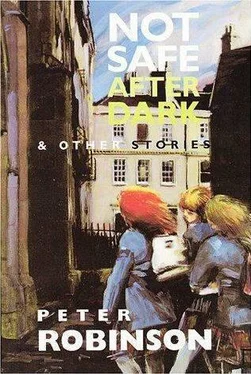As a rule, I will drink half a pint of Guinness with a slice of quiche or a cheese roll, say, and perhaps, once in a while, treat myself to a steak and kidney pie. As I eat, I work at the Times crossword, which I never seem able to finish before my glass is empty, and after my meal I enjoy a cigarette. I know the vile things are bad for me, but I can’t quite seem to give them up. Besides, how bad can one cigarette a day be? And only five days a week, at that.
Given its location in the City, the Mason’s Arms is generally busy, noisy and smoky by half past twelve on a weekday, and that suits me just fine. Lost in the crowd, buffeted by conversation and laughter that require no response on my part, I can concentrate on my crossword or allow my mind to drift in directions that the constant application of little grey cells to columns of figures precludes.
That particular lunchtime I found myself leaving the office a few minutes later than usual due to an important telephone conversation with an overseas client. The short walk also took longer because I had to struggle against the wind and rain with my rather flimsy umbrella. When I got to the Arms, as I had taken to calling it, I found my usual little corner table already taken by a stranger in a pinstripe suit. I could hardly tell him to sod off, so I carried my drink over and sat opposite him.
As he read his Times , I studied his features closely. I would guess his age at about forty-five – mostly because of the wrinkles around his eyes and the grey hair around his temples and ears – but having said that, I would have to admit that the overall effect of his face was one of youthfulness. He had bright blue eyes and a healthy, ruddy complexion, and he showed no sign of that dark, shadowy stubble that makes so many men look downright repulsive, not to mention sinister.
After I had finished my ham roll, I lit my cigarette and wrestled with eight down, letting the ebb and flow of conversation drift over me until a voice seemed to single itself out from the crowd and speak directly to me.
Startled, I noticed the man opposite looking at me in a way that suggested he had just spoken.
‘Pardon?’ I said. ‘I was miles away.’
‘“Crippen,”’ he said. ‘Eight down. “Quiet prince upset for this murderer.” It’s an anagram of “prince” and “p” for silent.’
‘Yes, I do see that, thank you very much.’ If my tone was a little frosty, it served the bugger right. I hate it when people solve my crossword clues for me, the same way I hate anyone reading over my shoulder. Takes all the fun out of it.
His face dropped when he saw the look I gave him.
‘I’m sorry,’ he said. ‘Very rude of me. Didn’t think.’
‘It’s all right.’ I put the crossword aside and flicked a column of ash at the floor.
‘Look, you wouldn’t happen to know anything about septic tanks, would you?’ he asked.
‘I’m afraid not.’ As far as conversational gambits went, this fellow wasn’t exactly heading for the top of the class in my book.
‘Oh. Pity. You see, we’re having one installed in a couple of weeks, my wife Harriet and I. I’m just not sure what kind of mess to expect.’
‘Well, I suppose they’ll have to dig the garden up,’ I told him. ‘But I can’t honestly say I’ve ever seen one, so I don’t know how big they are.’
He smiled. ‘Well, that’s the point, isn’t it? You’re not supposed to see them. We’re moving to the country, you know, to Hampshire.’
‘Why are you moving?’ I asked. And though I surprised myself by asking such a personal question of a complete stranger, it felt natural enough.
He sipped his gin and tonic before replying. ‘It’s for Harriet, mostly,’ he said. ‘Wants the country air. Not that I’d knock it, mind you. And it’s a beautiful cottage, or it will be after the renovations. Seventeenth century. I’ll keep the flat in town, of course, go down to the country at weekends. Yes, I’m sure it’ll work out.’
‘I hope so,’ I told him. Then I excused myself and headed back to the bank, it being almost one-thirty and Mr Beamish, the branch manager, being a real stickler for punctuality.
•
As time went on, our conversations became a regular feature of my lunchtime visits to the Arms, though I would be hard pushed now to think of everything we discussed: politics, of course, on which we disagreed; books, on which we agreed far more than we would have imagined; and marriage, about which we couldn’t quite make up our minds. Sometimes, we would just work on the crossword together in silence.
He also talked about weekends at the country house, of autumn walks in the woods, the occasional hovercraft trip to the Isle of Wight, quiet nights with a good bottle of claret, a hefty volume of Trollope, and a log fire crackling in the hearth.
Though I had never fancied country living myself, I must admit that Edward’s accounts made me quite envious. So much so that when Evelyn brought up the subject at home after watching a documentary on the Cotswolds, I thought it might become a real possibility for us, too, in a year or two’s time.
Edward and I never met at any other times or places – ours was a purely casual arrangement – but I like to think that a sort of friendship developed. Sometimes he didn’t turn up at all. He worked in international finance, he told me, and now and then he had to sacrifice his lunch hour for emergency meetings or telephone calls from strange time zones. Occasionally, he had to go abroad for a few days. But when he did come, we usually contrived to sit together and chat over our drinks and rolls for half an hour or so.
During that time, I didn’t find out very much more about his private life, and if I were to come to any conclusions they would be due entirely to my reading between the lines.
I didn’t ask Edward about his wife’s occupation, for example, but somehow I got the impression that she spent most of her time at home cooking, cake-decorating, cleaning, sewing, knitting and such. What people used to call a ‘housewife’ in the old days. I suppose now she could call herself an ‘estate manager’ down in Hampshire. As far as their relationship went, it sounded perfectly normal to me.
Though I had never met Harriet, I’m sure you can imagine how shocked I was on that bright, windy Thursday in early October when Edward came in a quarter of an hour later than usual, looking drawn and haggard, and told me that his wife had disappeared.
•
Naturally, I tried to comfort him as best I could over the following weeks, at least as far as our brief and irregular meetings allowed. But there was little I could do. For the most part, I could only look on sadly as Edward lost weight and his former ruddy complexion turned wan. Soon he came to remind me of the wretched youth in Keats’s poem: ‘Alone and palely loitering’.
Weeks passed, and still there was no sign of Harriet. Theories as to her disappearance varied, as they do in cases like this. One tabloid speculated that she had been abducted by a serial killer, then chopped up and buried somewhere. A local doctor suggested that she could have suffered some form of amnesia. If so, he went on, she might easily have wandered off and ended up living on the streets of London with the thousands of other lost and lonely souls. One neighbour, Edward told me, speculated that Harriet could have been actually planning her escape for some time and had simply taken off for America, Ireland or France to start a new life under a new name. With a new man, of course. Astonishingly, Edward also told me that even he had come under police suspicion at one time, albeit not for long.
Christmas came and went. It was about as cheerful as a wet weekend in July, the way it usually is for families whose children have all grown up and left home. Edward seemed to have gained a little colour when I saw him after the holidays. Or perhaps the Arctic winds we had that January had rubbed his skin raw. Anyway, it was around then that he started dropping in at the Arms for lunch less and less frequently.
Читать дальше










![Джеймс Чейз - Not Safe to Be Free [= The Case of the Strangled Starlet]](/books/417649/dzhejms-chejz-not-safe-to-be-free-the-case-of-the-thumb.webp)

